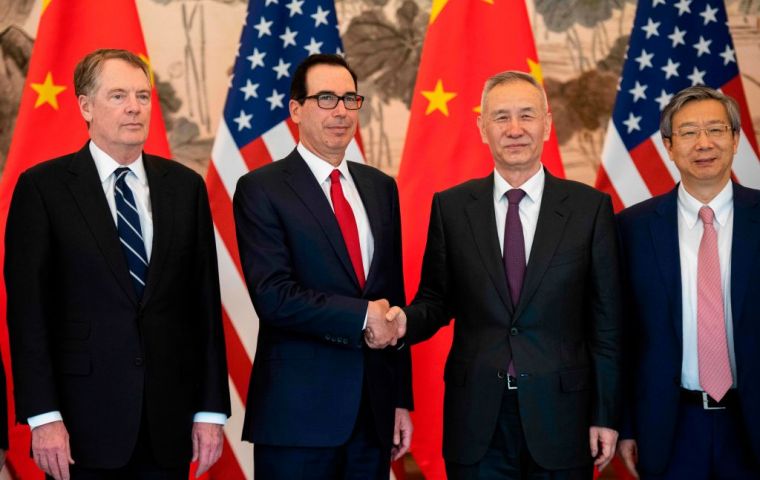MercoPress. South Atlantic News Agency
US and China in new round of trade talks in Beijing: some key issues remain to be discussed
 Talks have dragged on for months, with both sides struggling to agree on key issues. The trade war has hurt the economy and challenged the multilateral system
Talks have dragged on for months, with both sides struggling to agree on key issues. The trade war has hurt the economy and challenged the multilateral system The US and China are due to begin a fresh round of talks in Beijing on Tuesday as they edge closer to resolving their damaging trade dispute. The discussions will be led by US Trade Representative Robert Lighthizer and Chinese Vice Premier Liu He.
Talks have dragged on for months, with both sides struggling to agree on key issues. The trade war has hurt the economy and challenged the multilateral system that has governed world trade for decades.
There has been cautious optimism surrounding the talks in recent months but also a sense that both sides remain divided on some points.
The US, which accuses China of unfair trading practices, imposed tariffs on US$ 250bn worth of Chinese products last year. Beijing has retaliated with duties on US$ 110bn worth of American products.
Tariffs on US$ 200bn worth of Chinese goods were due to more than double at the start of the year, rising from 10% to 25%. But both countries agreed to suspend tit-for-tat tariffs after they struck a truce in December, and began negotiations to work towards a deal.
US President Donald Trump recently said the US and China had agreed on “a lot of the most difficult points” but that “we have some ways to go”.
Sticking points in negotiations in recent months have included how a deal would be enforced, issues around intellectual property protection, and how fast to roll back tariffs.
The US accuses China of stealing intellectual property and wants Beijing to make changes to its economic policies, which it says unfairly favor domestic companies through subsidies. It also wants China to buy more US goods to rein in a lofty trade deficit.
Mr Xi addressed some of these concerns last week at the Belt and Road forum in Beijing ahead of the trade talks. He said China would boost efforts to secure intellectual property protection, increase imports of goods and services and ensure a fair trading environment for firms.
But what makes trade negotiations particularly difficult to resolve is the fact they are part of a broader power struggle between the world's two largest economies.
China's growing influence has put many Western governments - and particularly the US on the defensive. Some in China see the trade war as part of US efforts to curb its rise. Against this backdrop, there is a view that the trade deal will not put an end to the US-China rivalry, which is already playing out in the technology sector.




Top Comments
Disclaimer & comment rulesCommenting for this story is now closed.
If you have a Facebook account, become a fan and comment on our Facebook Page!